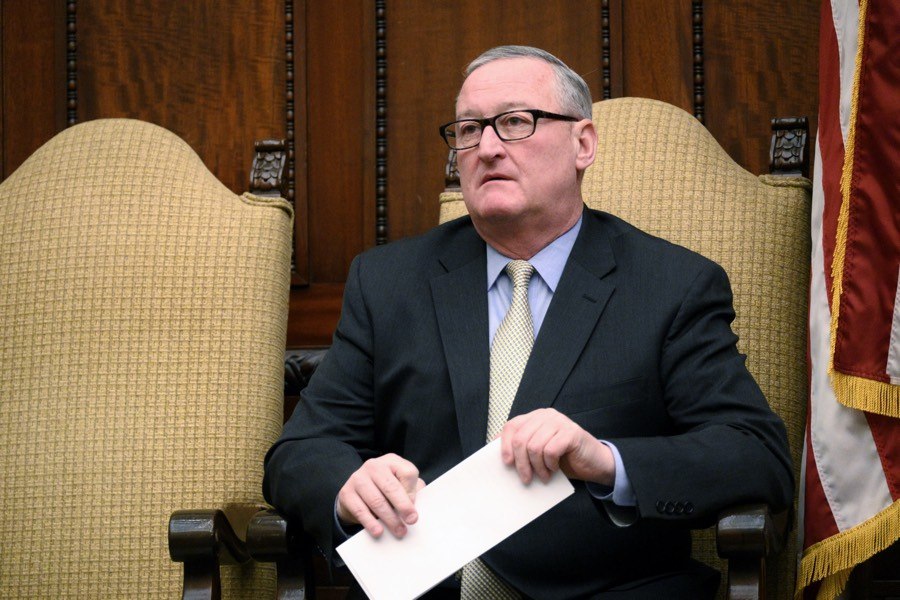In Praise of the City Government About-Face

Faced with demands from protesters, Mayor Jim Kenney has often responded by changing his mind. (Photo by Bastiaan Slabbers/NurPhoto/Getty Images)
Lately, lots of politicians have been changing their minds. Take Jim Kenney: In the last month and a half alone, the Mayor has pivoted from a plan that would have seen the Frank Rizzo statue removed sometime in 2021 to ferreting the bronze-casted racist away under the cover of night. He has defended the use of tear gas on protesters, only to apologize weeks later. He has resisted protesters’ calls for the resignation of Managing Director Brian Abernathy, only to accept Abernathy’s departure shortly thereafter. Most recently, he sent out a press release on Monday this week saying the city planned to clear the protest encampment of homeless people along the Ben Franklin Parkway, before reversing course on Thursday to say he would continue negotiations with the organizers and people living there.
This, it should be said, is fairly unusual behavior. Politicians are typically slow, stubborn creatures. When they win elected office, they earn that stamp of legitimacy known as the will of the people. Why change your mind when you were elected for your views? What’s more, on those occasions when a politician does change his or her mind in a significant way, the media is often there to latch on and call the decision a flip-flop (sorry, it’s our job!), the end result of which is only to further ossify the politician’s stubborn traits.
How are we to understand the recent rash of course reversals, though? It goes without saying that not every change of opinion is bad. Some are enlightened; others are cynical. So which kind are Kenney’s?
To answer that question, we first need to decide: Is the change of behavior in service of an ethical cause, or is it strategic politicking? The Abernathy, Rizzo and Parkway decisions are clearly the former. That’s not to say the decision to respond to protest demands isn’t strategic. But neither of the three decisions is an abandonment of morals; rather, it’s an embrace of them, even if it’s long overdue and took some pushing. The realization is that the city shouldn’t be clearing an encampment of homeless people protesting housing policy during a pandemic, nor should it honor a racist like Rizzo, or be managed by someone who presided over the tear-gassing of Philadelphians. (That last one could apply to the Mayor, too, though I wouldn’t count on Kenney adhering to the demand that he resign.)
Strategic politicking, on the other hand, is a different species of decision and is much easier to spot. One example: When the Mayor decided that his police department could continue stop-and-frisk, despite campaigning on ending that very policy. That’s an abandonment of morals.
The other thing we should be asking ourselves when analyzing the Mayor’s changes of heart: Is he honest about how he arrived at his new position? This is a much harder question to answer, because many of the most cynical about-faces sound like the most earnest ones. Mayor Kenney’s apology over the use of tear gas on I-676 falls into this category. In a statement shortly after the tear-gassing, Kenney said, “I am as disturbed as Commissioner Outlaw by what’s depicted in the New York Times video report,” referring to the embarrassing, high-profile story that prompted the apology. Left unsaid was the fact that local media had already written stories, with video evidence, that directly contradicted the police narrative. It was, in short, a disingenuous apology. (The lesson: Pay as much attention to what prompted the apology as the text of the apology itself.)
So Kenney hasn’t been perfect in his recent slate of mayoral reversals. But to give credit where credit’s due: He has actually responded to the protesters, a sign that they hold considerable sway over the administration. That’s no small feat considering how many protest movements succeed in turning out huge numbers of people, but struggle when it comes to actually securing policy goals.
Of course the protesters deserve the brunt of the credit here. Arguably the most significant accomplishment of the Black Lives Matter movement has been how it managed to change the will of the people — shifting public opinion on policing — and then continue to act as the representatives of the people in the streets. That is why, even as participation in the protests drops, the political pressure hasn’t waned. Elected representatives know there are many more at home who agree.
The old cliché about democracy is that the people are able to express their voice through the ballot box. But the truth is, elections don’t come around all that often — not to mention the fact that many people are wrongly disenfranchised and face other obstacles to voting. The protests then are a different kind of bullhorn — one that can sound at any time. Based on Kenney’s recent and repeated capitulations, they’re actually working.
When it comes to the most significant demand of all – defunding the police and reinvesting that money into other social services – Kenney has yet to be receptive. But the protesters are right to keep insisting on it. And if Kenney comes around, it will be a good about-face, too.


